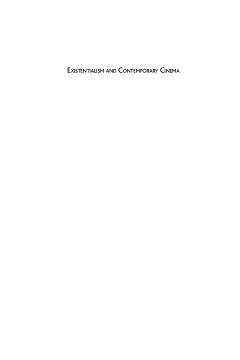
Additional Information
Book Details
Abstract
Simone de Beauvoir’s work has not often been associated with film studies, which appears paradoxical when it is recognized that she was the first feminist thinker to inaugurate the concept of the gendered ‘othering’ gaze. This book is an attempt to redress this balance and reopen the dialogue between Beauvoir’s writings and film studies. The authors analyse a range of films, from directors including Claire Denis, Michael Haneke, Lucille Hadzihalilovic, Sam Mendes, and Sally Potter, by drawing from Beauvoir’s key works such as The Second Sex (1949), The Ethics of Ambiguity (1947) and Old Age (1970).
Jean-Pierre Boulé is Professor of Contemporary French Studies at Nottingham Trent University and the author of a number of books, notably on Sartre, including Sartre médiatique (1992) and Sartre, Self-Formation and Masculinities (2005). He is the co-founder of the U.K. Sartre Society and executive editor of Sartre Studies International. His most recent books include Jean-Paul Sartre: Mind and Body, Word and Deed, co-edited with Benedict O’Donohoe (2011) and a companion volume to the present one, Existentialism and Contemporary Cinema: A Sartrean Perspective, co-edited with Enda McCaffrey (2011).
“This is a lively collection of [challenging and enriching] essays which thoroughly demonstrates the importance of de Beauvoir’s thought to film studies.” · Journal of American Studies of Turkey
“This volume emerges at a time of reinvigorated interest both in the work of Simone de Beauvoir and in its implications for screen studies and film philosophy…The revitalization of Beauvoir’s thought comes from the capacity of the films themselves to stage, choreograph, and reframe the complex possibilities of feminine and, by extension, human experience. This book aptly stages such an encouraging philosophical aspiration.” · French Studies
“The volume convincingly demonstrates the enduring value of Beauvoir’s work, and makes a very distinctive contribution to contemporary French film studies.” · Modern and Contemporary France
“[The editors] accomplish this genre’s most important task: framing the collection with an urgency that leads a reader to wonder how such a book didn’t already exist…By the time I’d reached the end of the book, I wanted more [which] suggests the strength of this book, its provocative existential claims a compelling reason for its own existence.” · H-France Review
“This collection of essays on the relationship between Simone de Beauvoir's philosophy and film studies is very welcome and long overdue… The book achieves the [editors'] stated aim and demonstrates beyond question the potential for exciting and illuminating film thinking that lies in the bringing together of Beauvoir's work and cinema…. The alignment between Beauvoir and films may not always be so direct, but the possibilities for what the relationship might yield are excitingly indicated by this collection.” · Journal of Contemporary European Studies
“This book makes an original and valuable contribution to film studies and to French studies... Its intellectual agenda is innovative and worthwhile.” · Diana Holmes, University of Leeds
“This is an excellent volume of essays which addresses a relatively neglected topic and conceptual approach, and is of relevance across a range of interrelated areas, specifically film studies, French studies, existentialist studies, philosophy, modern cultural and media studies.” · Edmund Smyth, Manchester Metropolitan University
Ursula Tidd is Senior Lecturer in French Studies at the University of Manchester. She is the author of three monographs: Simone de Beauvoir, Gender and Testimony (1999); Simone de Beauvoir, Routledge ‘Critical Thinkers’ series (2004) and Simone de Beauvoir Reaktion ‘Critical Lives’ series (2009) as well as articles and chapters on Beauvoir’s autobiographies, fiction, and philosophy. She is currently writing a monograph on the Francophone Spanish Holocaust writer Jorge Semprún (forthcoming with Legenda/MHRA 2013).
